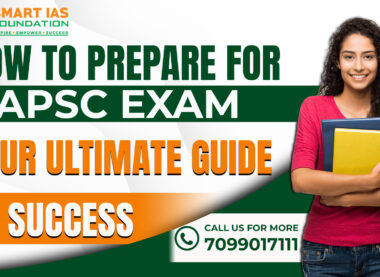The Assam Public Service Commission (APSC) conducts the Combined Competitive Examination (CCE) — a gateway to prestigious state government services such as Assam Civil Service (ACS) and Assam Police Service (APS). Every year, thousands of aspirants dream of wearing these badges of honor and serving the people of Assam.
If you’re one of them, this comprehensive guide will take you through every detail of the APSC exam — from eligibility, syllabus, and pattern to preparation strategy and how expert APSC coaching can accelerate your success.
Understanding the APSC CCE Exam
What Is the APSC CCE?
The APSC Combined Competitive Examination (CCE) is a state-level recruitment exam conducted by the Assam Public Service Commission to select candidates for Group A and Group B administrative posts under the Government of Assam.
It is Assam’s equivalent of the UPSC Civil Services Examination — designed to select capable individuals for leadership roles in state administration, police, taxation, and development sectors.
Services Offered Through APSC CCE
Through this single exam, candidates can join several elite services, including:
Assam Civil Service (ACS)
Assam Police Service (APS)
Block Development Officer (BDO)
Superintendent of Taxes / Excise
District Transport Officer (DTO)
Labour Inspector / Labour Officer
Assistant Employment Officer, and more.
These services represent the backbone of governance in Assam, handling policy, law enforcement, and public welfare implementation.
APSC Eligibility Criteria 2025
Educational Qualification
Candidates must hold a Bachelor’s degree from a recognized university. Degrees from foreign institutions are valid only if recognized by the Association of Indian Universities (AIU) or the Government of India.
Age Limit and Relaxation
For General Category:
Minimum Age: 21 years
Maximum Age: 38 years (as per latest notification)
Relaxations:
OBC/MOBC: +3 years (41 years max)
SC/ST(P)/ST(H): +5 years (43 years max)
PWD candidates: Additional 10 years relaxation.
Domicile and Language Proficiency
Applicants must be permanent residents of Assam and registered in an Assam Employment Exchange. Proficiency in Assamese or any official/tribal language of the state is mandatory.
APSC Exam Pattern and Syllabus
Stage 1: Preliminary Examination
Two papers (Objective type):
Paper I – General Studies (200 marks)
Paper II – CSAT/Aptitude (200 marks)
Duration: 2 hours per paper.
Negative marking: 0.25 marks per wrong answer.
Paper II is qualifying in nature (minimum 33% required).
Stage 2: Main Examination
Descriptive type with six papers (250 marks each).
Subjects include:
Essay
General Studies I–IV
Assam-specific studies.
Total Marks: 1500
Duration: 3 hours per paper.
Stage 3: Interview / Personality Test
Marks: 180
Evaluates leadership, communication, analytical ability, and suitability for public service.
(Prelims marks are not counted in final merit.)
APSC Salary, Perks & Career Growth
Pay Scale
ACS/APS Junior Grade: ₹30,000–₹1,10,000 + Grade Pay ₹13,300.
Average in-hand salary: ₹60,000–₹70,000/month.
Perks
DA, HRA, TA, Medical benefits, LTC, Pension.
Government quarters often provided.
Career Progression
ACS: Assistant Commissioner → ADC → DC → Secretary.
APS: DSP → SP → DIG → IGP → DGP.
APSC Coaching – Why It Matters
Preparing for APSC is a marathon, not a sprint. While many attempt self-study, structured APSC coaching provides discipline, conceptual clarity, and Assam-specific insights — vital for cracking the exam on the first attempt.
Benefits of Joining a Good Coaching Institute
Regular classes and mock tests.
Access to experienced mentors.
Guidance on answer writing and time management.
State-specific study materials and current affairs updates.
How Smart IAS Foundation Supports Aspirants
Preparing for the Assam Public Service Commission (APSC) exam is not just about studying hard; it’s about studying smart — and that’s where Smart IAS Foundation stands out as one of Assam’s most reliable names in APSC coaching. Known for its student-first approach and result-oriented methodology, Smart IAS Foundation has become a trusted destination for aspirants who aim to secure top ranks in services such as the Assam Civil Service (ACS), Assam Police Service (APS), and other allied posts under the state government.
The institute’s approach to preparation is deeply student-centric. It understands that every aspirant’s journey is unique — while some students are recent graduates exploring civil services for the first time, others are working professionals managing their studies alongside jobs. To accommodate this diversity, Smart IAS Foundation follows a personalized model of teaching that focuses on individual learning needs. Each student’s strengths and weaknesses are analyzed, and customized study plans are prepared accordingly. Regular doubt-clearing sessions, mentorship calls, and small-batch classes ensure that no student is left behind, no matter their starting point. This personalized support system has become one of the hallmarks of Smart IAS Foundation’s success in APSC coaching.
Another key strength of the institute lies in its experienced faculty. Smart IAS Foundation brings together some of the most qualified mentors, subject experts, and former civil service candidates, who understand both the exam pattern and the mindset required to crack it. The faculty focuses on conceptual clarity, analytical thinking, and application-based learning rather than rote memorization. Subjects like Polity, History, Geography, Economy, and Ethics are taught with real-world examples and current affairs integration, helping students build long-term understanding. The teachers also emphasize Assam-specific knowledge — from the state’s history and geography to its socio-economic issues and government policies — ensuring that students are well-prepared for the Assam-centric sections that carry significant weight in both Prelims and Mains.
In addition to classroom teaching, Smart IAS Foundation provides meticulously curated study materials that cover both general and Assam-specific content. These notes are concise, updated, and aligned with the latest APSC syllabus, saving students the time and confusion of browsing through multiple sources. The materials include summaries of government schemes, state budgets, important events, and current affairs compilations, all written in an easy-to-revise format. Many students who have cleared the exam credit their success to these focused, exam-ready notes that eliminate unnecessary clutter.
APSC Preparation Strategy for Beginners
Preparing for the Assam Public Service Commission (APSC) CCE can feel overwhelming for first-time aspirants — but with the right plan, discipline, and smart guidance, anyone can succeed. Whether you’re a student, working professional, or someone switching careers, a structured strategy is essential. This section will help you build a strong foundation and stay consistent throughout your preparation journey.
1. Understand the APSC Exam Structure First
Before you start studying, take time to fully understand the exam pattern and syllabus. Many beginners jump straight into books without knowing what to study — a major mistake.
Prelims: Two objective papers – General Studies and CSAT.
Mains: Six descriptive papers – Essay, GS-I to GS-V.
Interview: Personality test evaluating communication, confidence, and knowledge.
👉 Pro Tip: Go through the official syllabus PDF from the APSC website. Print it, highlight important topics, and pin it near your study desk. This will keep your focus sharp.
2. Create a Realistic Study Plan (Not a Fancy One)
A 12-month plan works best for full-time aspirants, while working professionals can stretch it to 15–18 months.
Break your preparation into phases:
Phase 1 (3 months): Focus on NCERTs (Class 6–12) for History, Geography, Polity, and Economy.
Phase 2 (4 months): Move to standard books like Laxmikanth, Ramesh Singh, and Majid Husain.
Phase 3 (3 months): Practice previous year question papers and take mock tests.
Phase 4 (2 months): Revise intensively and focus on Assam-specific current affairs.
✏️ Daily Routine Example:
2 hours – General Studies (static topics)
1.5 hours – Current Affairs
1 hour – Assam-specific topics
1 hour – Revision or Answer Writing Practice
Keep Sundays for mock tests and performance review.
3. Focus on Assam-Specific Topics from Day One
Many first-timers underestimate the weight of state topics — but nearly 30–35% of questions in Prelims and an entire paper in Mains are based on Assam.
Start covering:
Assam’s History, Culture, and Geography (use S.L. Baruah and Priyam Goswami)
State Government Schemes and budget (read Assam Tribune & DIPR updates)
Socio-economic issues specific to Assam (use Economic Survey of Assam)
💡 Tip: Maintain a separate notebook titled “Assam at a Glance” for quick last-minute revisions.
4. Strengthen Your Current Affairs Base
Current affairs form the backbone of both Prelims and Mains. For beginners:
Follow The Hindu or Indian Express for national news.
Read Assam Tribune daily for state updates.
Use monthly magazines like Vision IAS or ForumIAS for compilations.
Make micro notes under GS paper categories — this helps during revision.
📆 Duration: Cover at least 12–15 months of current affairs before the exam.
5. Practice Answer Writing Early
In APSC Mains, quality of expression matters as much as content. Even beginners should:
Practice writing one 250-word answer daily.
Focus on structured answers (Intro → Body → Conclusion).
Add Assam examples wherever possible.
Get feedback from mentors or peers (if enrolled in an APSC coaching program).
✍️ Example:
If the topic is “Women Empowerment,” mention schemes like Orunodoi or Kanaklata Mahila Sabalikaran Yojana — this shows Assam relevance.
6. Mock Tests and Self-Evaluation
Taking mock tests helps simulate the real exam environment.
Attempt at least 20–25 Prelims mock tests and 5–10 Mains papers before the exam.
Analyze mistakes — not just scores.
Revise weak areas immediately.
Institutes like Smart IAS Foundation provide structured test series that match APSC standards, helping beginners gauge their progress realistically.
7. Stay Consistent and Balanced
Remember — APSC preparation is a long-term process.
Study consistently (even 5 focused hours > 10 distracted ones).
Take short breaks to avoid burnout.
Track progress monthly.
Keep revisiting the syllabus to avoid missing topics.
And most importantly, believe that discipline beats intelligence in competitive exams.
✅ Quick Recap for Beginners:
Understand syllabus and pattern.
Build a realistic timetable.
Focus on Assam-centric content.
Read newspapers daily.
Practice answer writing.
Take regular mocks.
Revise consistently.
With patience, smart planning, and the right mentorship, clearing the APSC exam becomes achievable — even for a complete beginner. Start slow, stay steady, and let your consistency lead you to success.
Recommended Books for APSC
| Subject | Book Recommendation |
|---|---|
| Polity | Indian Polity – M. Laxmikanth |
| Economy | Indian Economy – Ramesh Singh |
| History | India’s Struggle for Independence – Bipan Chandra |
| Assam History | From Yandabo to Partition – Priyam Goswami |
| Geography | Certificate Physical and Human Geography – G.C. Leong |
| Ethics | Lexicon for Ethics, Integrity & Aptitude |
| Current Affairs | Assam Year Book, Assam Tribune |
Common Mistakes to Avoid
Ignoring Assam-specific content.
Over-relying on national books only.
Not practicing descriptive answer writing.
Poor time management and lack of revision.
Neglecting health and balance.
FAQs on APSC Coaching & Exam 2025
1. Can I write the APSC exam in English?
Yes, candidates can write in English or Assamese.
2. Is there any limit on attempts?
No fixed limit. Attempts depend on your age eligibility.
3. Does APSC have optional subjects?
No. The optional papers have been removed since 2022.
4. How often is APSC conducted?
Typically once every year.
5. Is coaching mandatory for APSC?
Not mandatory, but coaching helps with guidance and discipline.
6. What’s the best time to start APSC preparation?
Ideally 10–12 months before the Prelims.
Conclusion – Your Roadmap to Success in APSC 2025
The APSC CCE is not just an exam — it’s a journey toward leadership and public service. With the right guidance, consistency, and awareness of Assam’s socio-political context, anyone can succeed.
Institutes like Smart IAS Foundation can help you structure that journey, but ultimately, your dedication and discipline define your success. Start early, stay focused, and let every page you study bring you closer to becoming Assam’s next administrator.





